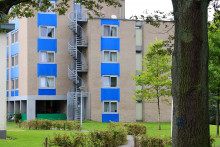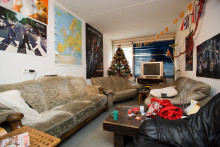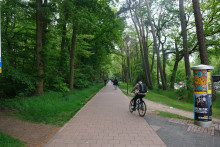So far, internationnal students at the UT have been accommodated in houses at the campus reserved specifically for them. However, as these houses are provided only on basis of a 1-year contract, international students face the struggle of finding housing when that year ends.
Although many internationals wish to stay on campus, a large part of the campus housing is occupied entirely by Dutch students. The Student Union has begun taking steps towards solving this issue, such as distributing a survey and hosting a forum to generate ideas for solutions.
Language barrier
The reason why internationals are less readily accepted into campus housing might be primarily due to the language barrier. ‘It’s quite important for me to be able to speak Dutch in my own home,’ says Kasper Wensing, a Dutch-born Campuslaan resident. ‘Internationals also have the right to live on campus, but naturally you would prefer a roommate that speaks your language. Even if just one international were to move in to a Dutch house, everyone would have to switch languages. It would be easier for internationals to find housing if they learned to speak Dutch, especially if they showed that they were really trying and wanted to live with Dutch speakers so they could practice their language skills.’
Ruben, Wensing’s flatmate, shares his experience living with an international roommate: ‘We had a lot of problems –we always had to switch to English as soon as she came into the room. She didn’t really integrate well.’

Mixed-nationality homes
While all residents of Wensing’s home are Dutch, mixed-nationality houses also face the same problems. ‘Personally I wouldn’t mind not speaking Dutch at home, however earlier we lived with two Germans who couldn’t speak Dutch,’ says Anouk de Jong, resident of a mixed-nationality home in Matenweg. ‘Then we found the language barrier to be quite an issue. Even though we tried to speak English, we would naturally switch back to Dutch, which probably made them feel less welcome. Other than that, I like living with different nationalities because you can get different perspectives on things, and it’s always really great to taste the local food my South African or German roommates make.’
‘A huge gap between us’
‘Customs are also really important to us. It’s the small things, but they make a difference,’ explains Lars Klarenbeek, one of Wensing’s flatmates. ‘For example we always eat together at 6 p.m., but if that is not something an international is used to – and on top of that he or she doesn’t speak the language – then there will be a huge gap between us. Our roommates are quite close to each other, that’s why integration is optimal so that internationals would be able to participate when we go out for a beer or playing a game.’
‘I also fear rules may be looser with other cultures. For instance we keep a cleaning schedule, and I’m afraid someone from another culture could be less likely to keep to this cleaning schedule. Also, we may handle problems differently. We are Dutch; if we have problems we speak of them openly and directly. But other cultures are not the same, and that can cause a little problem to escalate quickly. And I think it’s very important to get along with the people you live with. That’s why I really value being able to choose who lives with you,’ continues Klarenbeek.
‘I would feel left out’
For international students, it is the opposite side of the same coin. ‘I can sort of understand their reasoning – it’s their houses, they can decide which roommates they want,’ explains Arianna Girardi from Italy, currently residing in an all-international house at the Matenweg. ‘The thing is, if I were to live with Dutch people I would feel guilty for not being able to join in, and I wouldn’t want that.’ Thiago Dragman, Girardi’s housemate from Suriname, agrees with Girardi on this point, ‘I wouldn’t even want to live in a house where I am the only international, I would feel left out. I would prefer living with a good mix of people – a few internationals, a few Dutch.’
However, some international students are keen to participate in the Dutch way of living. ‘What we need now is integration, not internationalization,’ argues Varun Sudhakar, another resident of Matenweg’s all-international house. ‘Personally, I really want to get to know Dutch culture. There are so many things we could have learned from them by living together that we instead have had to figure out on our own, such as how to buy an OV-Chipkaart or that the red ACASA box we get is meant for recycling paper only.’

Whose fault is it?
‘If international students don’t really try to learn to speak the language I don’t know why they try living on campus. I would be totally fine if an international wanted to live here, as long as they are trying to speak Dutch. However I feel that a lot of them really don’t make the effort,’ comments Klarenbeek. ‘Of course, if international students are making an effort to integrate and they still are not being accepted then it’s the Dutch people’s fault. But how we see it now is that a lot of them don’t bother trying, so then we also don’t bother putting in our half of the effort.’
Harindu Perera, a Sri Lankan housemate of Girardi, Dragman, and Sudhakar, poses a similar view: ‘You can’t expect the entire university to start speaking English just because some international students arrive.’
It is apparent that from the Dutch students’ point of view, it is the international students who should be the ones to initiate integration efforts. However, according to the international students, the university should work to welcome them into Dutch culture. ‘The university should encourage Dutch students to accommodate internationals by advertising it as an opportunity. Many people are interested in getting to know other cultures, to the extent that they sometimes go out of their way to do so, by travelling to other countries and whatnot. Why should that be any different here?’ suggests Perera.
‘Biggest problem is lack of integration into Dutch culture’
‘I find it stupid to only assist internationals with the one-year guaranteed housing,’ says Sudhakar. ‘Also, we should not have only Dutch and only international houses. The ratio of Dutch to internationals enrolled at the UT is approximately 70-30, so the same ratio should hold within the living quarters if we really want to make the university international. Since the biggest problem is the lack of integration into the Dutch culture, building more houses for internationals is not the solution. Rather than putting the incoming first-year internationals together in our own houses, we could instead be guaranteed a place in the Dutch student houses.’
Klarenbeek also offers a solution: ‘If the original tenants of a house speak English, they can then choose whoever they want to live with, and there is a higher chance for an international to get accepted into the house,’ proposes Klarenbeek.
Tinder for housing
‘Here’s an idea!’, exclaims Girardi. ‘Create an app where you can enter your name, nationality, the dates you need to rent a place for, your roommate preferences, and some information about yourself; then you will be matched with a house and roommates that suit you. It could be like Tinder, but for housing.’








